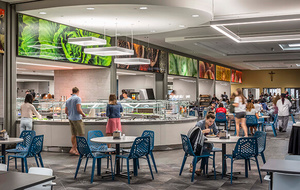 "
"
Campus Dining has begun to review dining hall operations on campus. With this process, several surveys have been sent out to the student body to consider student feedback and incorporate students’ needs when considering plans for the future. But how well has Campus Dining executed the needs of students?
The most blatant problem that needs to be addressed is the food itself. Students seek variety in both meal plans and meal choices, and many struggle to find healthy options and choices that follow their dietary preferences. The variety is severely limited; one can always find pasta, pizza or Mexican food, but eating these options every day does not provide the proper nutrition that students need. Those students that strive to eat healthy are limited to salads, chicken breasts and the vegan section. For vegetarians, finding proper sources of protein has proven to be an even greater challenge. Rachel Wittmer of Badin Hall struggles with this, finding that “vegetarian options are extremely limited. I have heard of many other colleges who are making an effort to serve more protein options for vegetarians in their dining halls beyond bland tofu and beans.”
Those with strict dietary restrictions feel that while the dining halls do make an effort to have sections partitioned off for special requirements — such as those with celiac disease or who choose to go gluten free — the cross contamination and inconsistent labeling make eating risky. This is especially true in Grab ‘n Go. Ella Wood of Lewis Hall finds that the way dietary restrictions are addressed needs to be reconsidered: “Several foods do not have allergen information listed. There is no variation in gluten or lactose free options and almost zero choice in Grab ‘n Go. Cross contamination is relatively common ... and restaurants do not have allergen information listed.”
Senior director of Campus Dining Chris Abayasinghe is aware of students’ concerns on healthy eating and dietary preferences, saying that “we acknowledge that, and we need to start doing that.” Abayasinghe conveyed that they are focusing on “the integrity of the ingredients” and that he personally “hopes to be communicating more with students and making information more ‘readily accessible.’”
The disparity in quality between North Dining Hall and South Dining Hall has also increased as of late. North has considerably more access to a diversity of salad and fruit options, while South has a homey, Hogwarts-like feel but has limited its variety and removed several food stations, including the popular fajita night. Abayasinghe told Scholastic that food preparation is different because of varying equipment between the two dining halls, and that food services “should begin planning the renovation of South” in the coming years.
Further, students have expressed the opinion that the structure of meal plans do not properly consider the way they eat. The current meal plans are inflexibly structured and cause students to waste many meal swipes each week. In the case of dietary restrictions, students want the option not to have a meal plan due to the lack of dietary accommodation, which can make a meal plan a waste of money. Abayasinghe acknowledged that Campus Dining is aware of the need to review meal plans: “We have heard the conversation about meal plans, and through our collective and collaborative leadership, this is an item that we plan on addressing this year.”
Despite the fact that Abayasinghe stressed communication with students, the way in which Campus Dining responds to student feedback perhaps needs to be reconsidered. The plans to build a new Flex Point restaurant with Mediterranean cuisine keeps with Campus Dining’s belief that “thinking about the restaurants of the future is how we as a department collectively improve upon our cuisine.”
The expansion of Flex Points restaurants, however, does not address the dining halls’ problems of dietary restrictions, variety or overall available nutrition. One anonymous student told Scholastic, “The dining halls are slacking this year, and I’ve noted a discernable difference in the cuisine’s quality during football weekends (when guests are present) versus an average Tuesday night.”
Students are calling for change in campus food, and they want Campus Dining to listen.